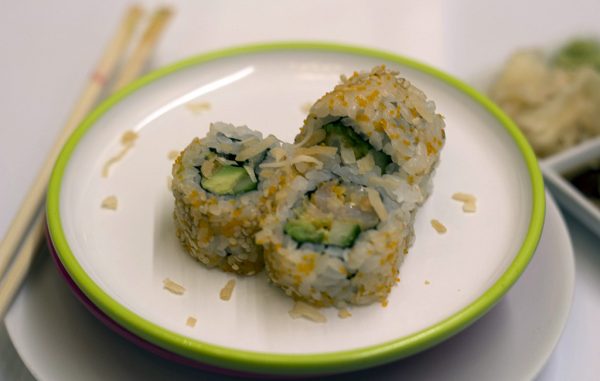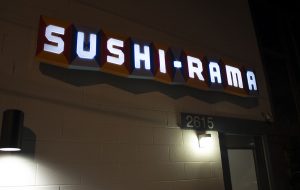Fresh sushi is a dish best served at scale.
That’s the thinking behind Sushi-Rama’s new commissary kitchen, a 2,800-square-foot facility the company is building in RiNo. The conveyor-belt sushi concept needs the commercial space to supply three more restaurants it plans to open this year and next.
Co-owner Jeff Osaka said the economies of scale – in this case, flying in fresh fish daily, curing it and chopping it into blocks – will improve in a single, central location at 3827 Steele St.
“That way, when they get to the store, there is very little skilled labor needed,” Osaka said. “We don’t need a sushi chef that needs to be trained for five to 10 years.”
Sushi-Rama, based in RiNo, has signed leases on three more restaurant locations – near Belleview Station in Denver, in Lone Tree and in Aurora. Osaka, who owns Sushi-Rama with developer Ken Wolf, is hungry for more: first in the suburbs outside of Denver and then in other Midwestern markets.
“We’ve got south and east covered, and are looking for locations in the west and north,” Osaka said.
He said Broomfield, Westminster, Arvada or Golden are potential next stops for the sushi chain.
Osaka, a California native, opened his first restaurant, Twelve, in 2008. After closing the seasonally inspired food shop, he moved on to Osaka Ramen in 2014. Last year, he had two new openings: 12@Madison in Congress Park and Denver Central Market in RiNo.
“We thought ramen was going to take off in Denver. It’s popular but it isn’t popular enough to expand on it,” he said.
But the sushi business is growing. Osaka said conveyor belt sushi is common on the coasts, and hopes to make it a hit in Midwest cities like Boise, Albuquerque, Kansas City and Oklahoma City.
“The attraction is that people can sit down and eat right away. You don’t need to wait for a server,” he said. “By the time you get your drinks you’ve already had two to three plates.”
All those potential markets will need to make sushi at scale as well, Osaka said, and Denver is the testing ground.
He said the RiNo kitchen space, in an industrial park that Wolf owns, will house coolers large enough to fit wooden pallets as well as a cutting and processing room. Sushi-Rama also will outfit office space at the Steele Street facility.
Fresh sushi is a dish best served at scale.
That’s the thinking behind Sushi-Rama’s new commissary kitchen, a 2,800-square-foot facility the company is building in RiNo. The conveyor-belt sushi concept needs the commercial space to supply three more restaurants it plans to open this year and next.
Co-owner Jeff Osaka said the economies of scale – in this case, flying in fresh fish daily, curing it and chopping it into blocks – will improve in a single, central location at 3827 Steele St.
“That way, when they get to the store, there is very little skilled labor needed,” Osaka said. “We don’t need a sushi chef that needs to be trained for five to 10 years.”
Sushi-Rama, based in RiNo, has signed leases on three more restaurant locations – near Belleview Station in Denver, in Lone Tree and in Aurora. Osaka, who owns Sushi-Rama with developer Ken Wolf, is hungry for more: first in the suburbs outside of Denver and then in other Midwestern markets.
“We’ve got south and east covered, and are looking for locations in the west and north,” Osaka said.
He said Broomfield, Westminster, Arvada or Golden are potential next stops for the sushi chain.
Osaka, a California native, opened his first restaurant, Twelve, in 2008. After closing the seasonally inspired food shop, he moved on to Osaka Ramen in 2014. Last year, he had two new openings: 12@Madison in Congress Park and Denver Central Market in RiNo.
“We thought ramen was going to take off in Denver. It’s popular but it isn’t popular enough to expand on it,” he said.
But the sushi business is growing. Osaka said conveyor belt sushi is common on the coasts, and hopes to make it a hit in Midwest cities like Boise, Albuquerque, Kansas City and Oklahoma City.
“The attraction is that people can sit down and eat right away. You don’t need to wait for a server,” he said. “By the time you get your drinks you’ve already had two to three plates.”
All those potential markets will need to make sushi at scale as well, Osaka said, and Denver is the testing ground.
He said the RiNo kitchen space, in an industrial park that Wolf owns, will house coolers large enough to fit wooden pallets as well as a cutting and processing room. Sushi-Rama also will outfit office space at the Steele Street facility.



Leave a Reply